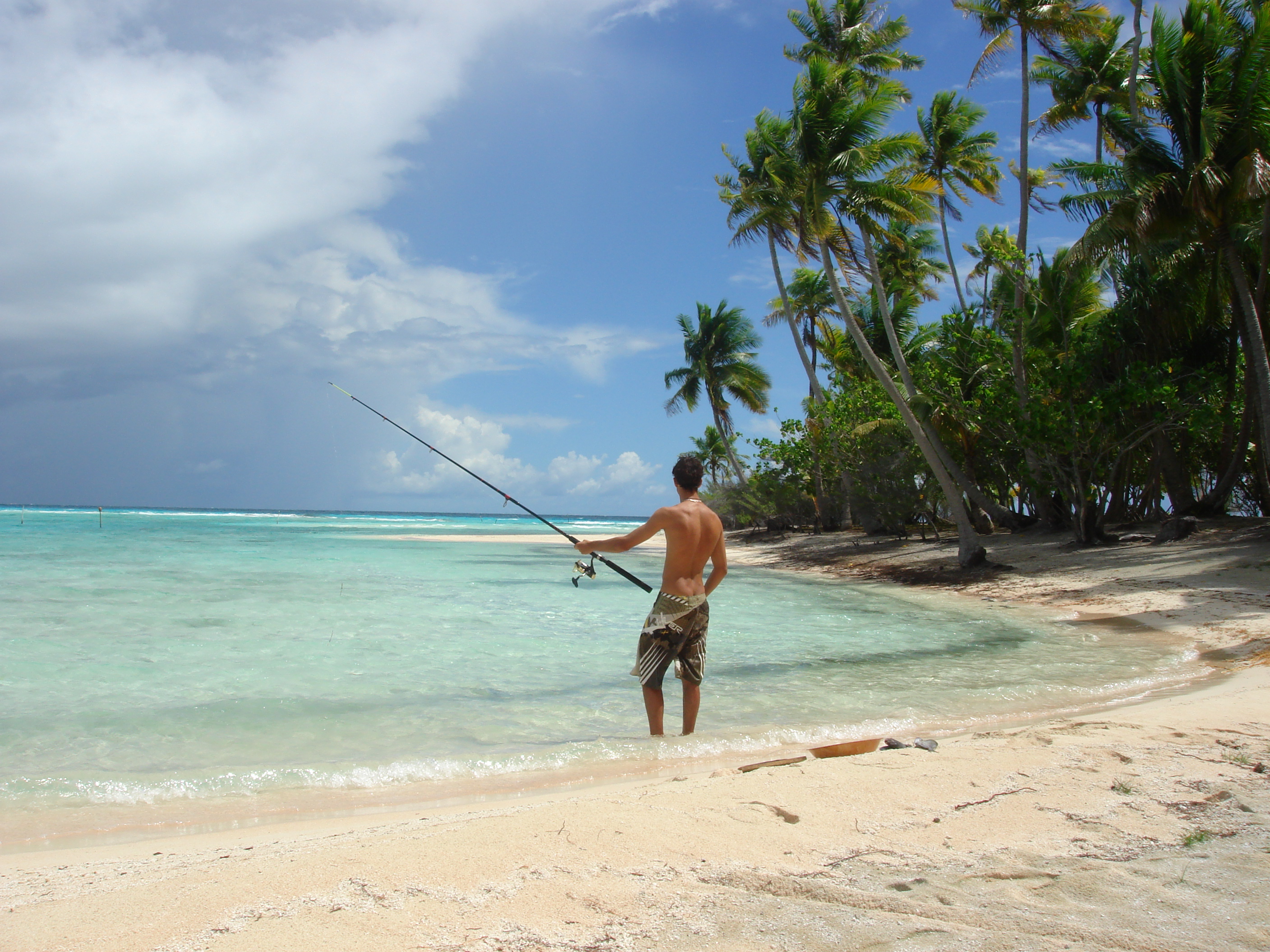My New Island Home By Michael Gebicki

By Michael Gebicki,
“EH, mes amis, come on! Let’s go and get some fish, its a nice day, no?” Actually, no. It’s raining off and on, the wind is howling, the sea is quarrelsome and I see no reason to leave where I am, thanks very much, because it’s pretty dishy. I have a cook at my beck and all, a well-stocked fridge, lots of books and a 100cm flat-screen television with a pile of DVDs. But it’s Ugo Angelic doing the talking, and this is not a man to be denied. “We meet at loam, at the jetty,” he says. We clamber aboard his boat and set off east along the chain of motus, the string of sand and coral islets that form the necklace that is Rangiroa in French Polynesia.
Each motu is a slightly different variation on the same elements of sand and coconut palms on an upside-down coral saucer. On the ocean side is a limestone platform with a live coral ribbon where waves batter against the reef. After about 45 minutes we reach the most easterly of Rangiroa’s motus and in its lee we beach at a sand cay, a comma of pink tinted sand about 100m long, rising to just half a metre above the waves. As our bow crunches into the sand, several dark shapes converge on the stern of the boat. “Come on my babies,” booms Ugo. “Ah, here’s Odette and Henri, and look, there’s Paul come to say bonjour.” Within a minute a dozen black tipped reef sharks are circling the stern. By this time we’re standing ankle deep and Heiarii, Ugo’s wingman, is heaving chunks of raw fish into the water while the sharks zoom in and snatch. Meanwhile, Ugo has installed a noose of heavy black rope in the water, with the bottom buried in the sand and the top floating. Slowly, Heiarii is working the sharks toward the noose. They circle closer and closer as they chomp the hunks of bloody fish, darting away from the noose at the very last moment. Heiarii is almost down to his last piece of fish when one of the bigger sharks glides through the noose, Ugo pulls and the beast is hauled thrashing on to the beach.
Ugo loosens the rope, grabs the shark just below the pectoral fins and heaves it into the air. The shark is not taking kindly to this; it’s thrashing violently from side to side, 20kg of muscle and jaws fighting for its life. “Go ahead,” says Ugo between clenched teeth. “Touch it.” So I do, tentatively, on the stomach. Finally he lays it gently back in the water and the shark swims off. On the way back we stop to snorkel among the coral bommies that blotch the Listerine-blue of the lagoon. It’s the standard roll call of tropical marine life, with the addition of more sharks and a big cod. Ugo stops at each bommie for about 30 seconds for a quick look, then swims like mad to the next, which might be 30m away. In a choppy sea with a current, it’s the most energetic snorkeling I’ve done.
Now it’s time for a spot of fishing. Ugo loads up his Shakespeare Ugly Stik rod with his favourite squid lure and the Penn reel sings as he drops a 65m cast within the shadow of a reef. On the third cast, Ugo winds in a perch, which he releases. A couple more and there’s a trevally. He wants to let it go but it’s swallowed the lure. Death is swift. “Dinner,” says Ugo. It’s mid-afternoon by the time we get back to the jetty at Motu Tetaraire, or Motu Teta for short. This is my island home, because for the duration of my stay, I am sovereign lord of this barefoot, pint-sized kingdom of crystalline sand and coconut palms. Motu Teta is a private island with two villas, a rare thing in French Polynesia. This is the native home of the overwater bungalow, a species that thrives in the sheltered lagoons that are the distinguishing characteristic of French Polynesia.
The Main Villa has two big bedrooms with king-sized beds and another with a single bed. Each of the main bedrooms has an ensuite bathroom. In the middle is the lounge, dining room and kitchen. From waist up, the panels that make up the walls can be swung open to the trade winds. At the front is a big deck with couches and loungers from where coconut palms and pandanus frame the lagoon of Rangiroa. Guest Bungalow Royals is smaller, but it still has two decent sized bedrooms with queen beds, a lounge room in the middle and a timber deck at the front. The entire island and its two villas are sold as a package. The price tag might cause an initial attack of giddiness, but if you can put together a group of six or eight, it’s about par for the price per person of an overwater bungalow on one of the better establishments on Bora Bora. And at Motu Teta, there are the advantages of sovereignty and significantly superior add-ons. I can walk around the 3.6ha island in less than 15 minutes, but there are distractions. There are sea vistas framed by swooning coconut palms, and red-clawed hermit crabs the size of a mandarin that will only emerge if I am quiet and patient. I might slip into the deep water by the jetty for a dip, with a quick check on the whereabouts of Princess Yvonne, an enormous moray eel that lives under the jetty. I can also snorkel among coral that begins in the knee-deep water right in front of the Main Villa. There is also the intangible advantage of the privilege of exclusivity.
There is no sound that is not made by wind and sea, no boats on the horizon, no sign of human habitation and nobody else can come on board without my say-so. Motu Teta also comes with a charming cook, Celine, Ugo’s wife, who brews up fresh coffee when she hears me stirring shortly after daybreak. And then there’s Ugo: boatman, naturalist, multilingual guide, as brown as a nutmeg, shoulders like a charolais bull and then some. Ugo is here to do my bidding, in theory. But in fact we’re in no doubt who’s boss here. By virtue of the fact that he knows where to fish, where to find water, where to shelter if the weather kicks up, because he can find coconut crabs, because he hauls me outside at night and shows me the stars that he would use to navigate across the oceans and because he knows the stories of this place, Ugo holds the keys to this world.
This is his domain. I’m just along for the ride. Every day Ugo conjures up something different. One sunny afternoon we paddle out and explore the reef that protects Motu Teta, where the sea has chewed the fossilised coral into fantastic shapes. “We’re going to find turbo shells for dinner… you know turbo shells?” he says one morning. “You see them and you have to step on them very fast before they get away.” In fact the turbo is a large snail that bolts itself to sea rock, but we relish the joke all the same. Celine serves them up as an hors-d’oeuvre with a bottle of Moet & Chandon Reserve Imperiale Champagne (part of the house’s supply) while Heiarii plays the ukulele and serenades. On the way back to the airport we stop off at Tiputa Pass, one of the few places where the motus of Rangiroa Atoll are broken by a deepwater channel. Powerful currents sweep through the pass from the open sea, delivering nutrients that spark an explosion of marine life.
Tiputa Pass is famed as one of the world’s most spectacular drift dives. Drop in at Shark Cave on the oceanside and the current sweeps you into the lagoon, past hammerhead sharks, manta rays and dolphins. Ugo tosses fish scraps over the side and the water boils. We gear up with snorkels and fins and slip into the sea. I’ve never seen such a concentration and variety of tropical marine life in such a small area anywhere. We were swarmed by triggerfish, fusiliers, angel fish and butterfly fish, while black-tipped reef sharks and a huge Napoleon wrasse glide below us. We spot three of the fattest and scariest moray eels I’ve seen. “Look here, it’s Ugly,” says Ugo, and he ducks under to coax a particularly impressive moray eel from its hole. There’s barely time to dry off before it’s all over. Ugo leaves me at thejetty near the airstrip, from where a two-minute stroll will take me to the air terminal for the flight back to Papeete. “Come, I will hug you,” says Ugo, and as he does, I can’t help noticing that although I am not small, my arms reach less than halfway around his back.
Michael Gebicki was a guest of Tourisme Tahiti, Motu Teta and Air Tahiti Nui.


